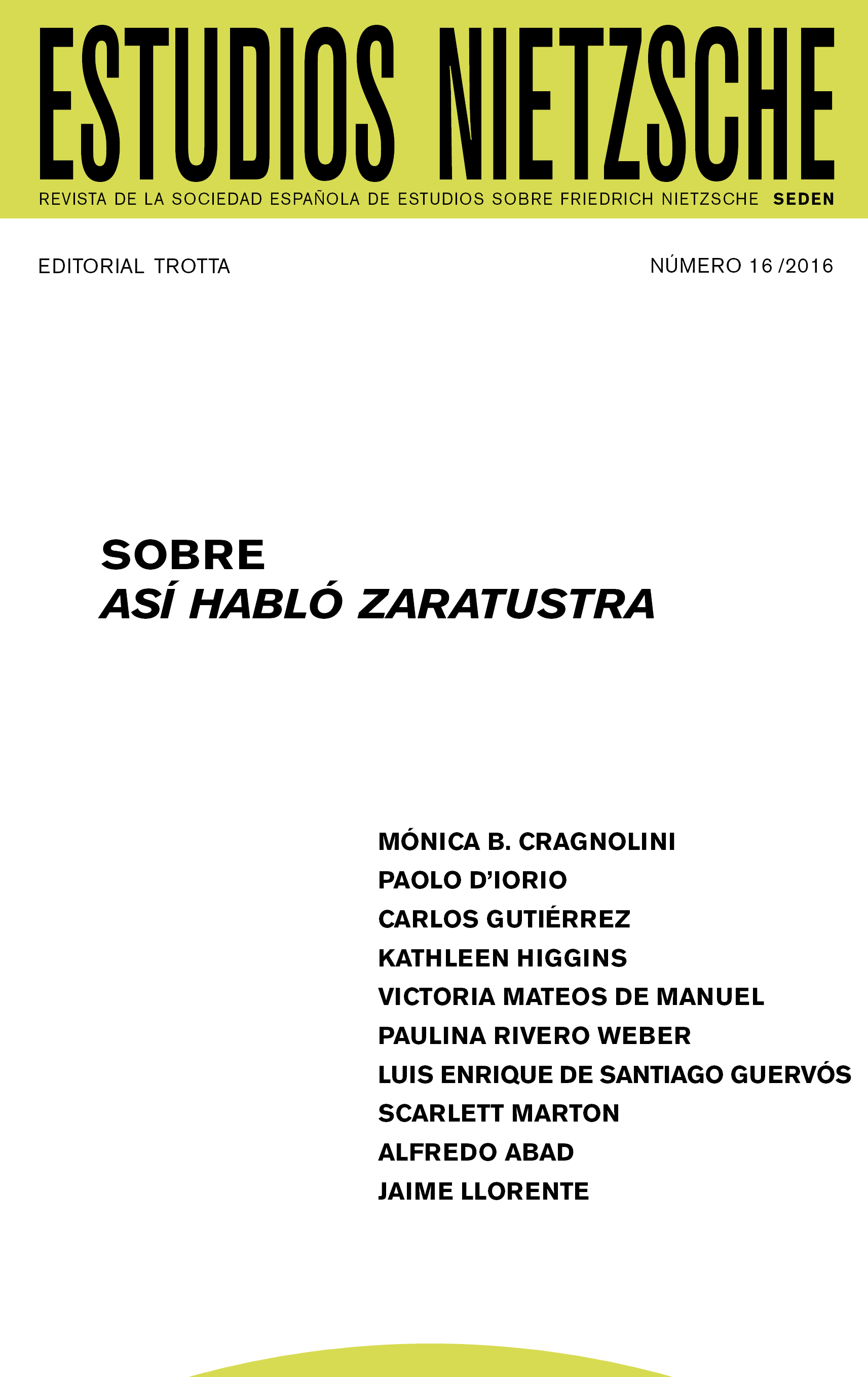Overture for a tragic drama
DOI:
https://doi.org/10.24310/EstudiosNIETen.vi16.10818Keywords:
music, prologue, clues, philosophyAbstract
Thus Spoke Zarathustra is a musical work in the Nietzschean sense of the term. If we ask to what musical form it belongs, Nietzsche himself left open two possibilities: the symphony or the tragic drama. Based on the proposal of The Birth of Tragedy, Gay Science, the posthumous fragments, and his correspondence, this paper is committed to the second of these possibilities. Hence, it’s devoted to show in what sense the Prologue of this work is a totality which contains the seed of the whole work, namely that the Prologue is a musical overture.
Downloads
Metrics
References
Burnham, Douglas y Martin Jesinhausen, Nietzsche’s Thus Spoke Zarathustra, Edinburgh: Edinburgh University Press, 2010.
Creutzer F., Symbolik und Mythologie der alten Völker, 3 edición, 4 volúmenes Leipzig and Darmstadt 1836 – 1843.
Gillespie. Michael A. y Tracy B. Strong, Nietzsche’s New Seas, Explorations in Philosophy, Aesthetics, and Politics ed, Chicago: Chicago: University of Chicago Press, 1988.
Hollinrake, Roger, Nietzsche, Wagner and the Philosophy of Pessimism. London/New York: Routledge Library Editions, 2010.
Janz, C. P., Nietzsche, Vol 2, trd. de Jacobo Muñoz e Isidoro Reguera, Madrid: Alianza, 1981: «¿Es Zaratustra una sinfonía?» pp. 167 - 195
Nietzsche, F., Obras Completas, I-IV (OC ). Director ed. Diego Sánchez Meca. Madrid: Tecnos, 2011-2016
Nietzsche, F., Correspondencia I-VI. (CO). Director ed. Luis E. de Santiago Guervós. Madrid : Trotta, 2005- 2012.
Nietzsche, F., Fragmentos Póstumos I-IV (FP). Director ed. Diego Sánchez Meca. Madrid: Tecnos, 2006-2010.
Parkes, Graham, «The Symphonic Structure of Thus Spoke Zarathustra: A Preliminary Outline« en James Luchte,
Nietzsche’s “Thus Spoke Zarathustra”: Before Sunrise. London/New York: Continuum, 2008.
Parkes, Graham, Thus spoke Zarathustra, Oxford: Oxford World’s Classics, Oxford University Press, 2008.
Rivero Weber, P., Nietzsche y su música. Estudio introductorio, México: UNAM, 6ta edición, 2015, p. 3.
Santiago Guervós, L. E. de, Arte y poder, aproximación a la estética de Nietzsche. Madrid: Trotta, 2004.
Woodruff, M. K., «Untergang und Übergang: The Tragic Descent of Socrates and Zarathustra», en The Journal of Nietzsche Studies, 34, Autumn 2007, pp. 61-78.
Yáñez, Adriana, Los Románticos: nuestros contemporáneos. México: Alianza Editorial/UNAM, 1993.
Zubiría, Martín, Nietzsche. Mundo Amado, Amada Eternidad. Buenos Aires: Ediciones del signo, 2009.
Downloads
Published
How to Cite
Issue
Section
License

This work is licensed under a Creative Commons Attribution-NonCommercial-ShareAlike 4.0 International License.
As of issue 21 (2021) this journal is published only in open access (diamond route).
From that number 21, like the previous numbers published in NIETZSCHE STUDIES, they are subject to the Creative Commons Acknowledgment-NoComercia-ShareIgual 4.0 license, the full text of which can be consulted at <http://creativecommons.org/licenses/by-nc-sa/4.0 >
It is the responsibility of the authors to obtain the necessary permissions of the images that are subject to copyright.
This work is licensed under a Creative Commons Attribution-NonCommercial-ShareAlike 4.0 International License.
Copyright generates two different rights: moral rights and patrimonial rights that EJFB recognizes and respects. Moral rights are those relating to the recognition of the authorship. They are rights of a personal nature that are perpetual, inalienable, unseizable and imprescriptible as consequence of the indivisible union of the author and his/her work.
Patrimonial rights are those that can be derived from the reproduction, distribution, adaptation or communication of the work, among others.







11.png)
